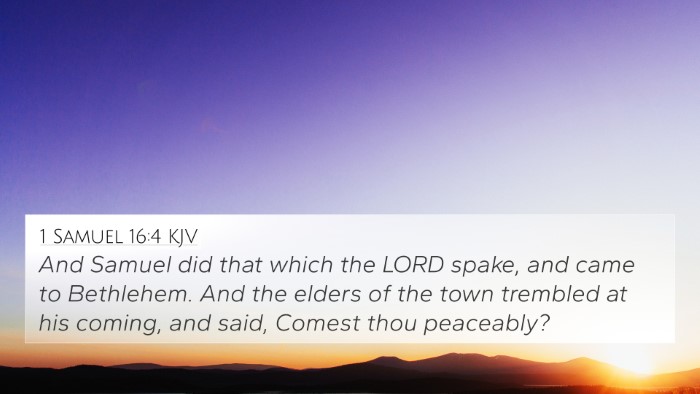Exploring the Meaning of 1 Samuel 18:12
1 Samuel 18:12 states: “Saul was afraid of David, because the LORD was with him, but had departed from Saul.” This verse encapsulates the tension and turmoil experienced in the lives of both Saul and David, reflecting deeper themes of divine favor, jealousy, and the consequences of disobedience.
Contextual Background
Matthew Henry emphasizes that this passage follows the victory David achieved over Goliath, establishing David's rising popularity among the people of Israel. Saul, once celebrated as king, begins to grow fearful as he perceives David's potential to usurp his throne.
Albert Barnes notes that Saul's fear signifies his awareness of the spiritual dynamics at play; he recognizes that the LORD has abandoned him due to his continued disobedience, whereas David, a man after God’s own heart, is blessed with divine favor.
Adam Clarke interprets this fear not merely as a rational response but as a profound spiritual insight into how God operates in the lives of His chosen; it serves as a reflection on the importance of staying faithful to God’s commands.
Thematic Developments
- Divine Favor: The juxtaposition between Saul and David illustrates how divine favor is contingent upon obedience to God.
- Fear and Jealousy: Saul's fear stems from jealousy and insecurity, serving as a warning about the destructive nature of envy.
- Spiritual Departure: The departure of the Spirit from Saul signifies the consequences that come with defying God and the loss of leadership privileges.
Inter-Biblical Reflections
This verse relates to several vital passages throughout the Bible. Here are 8 cross-references that enrich the understanding of 1 Samuel 18:12:
- 1 Samuel 15:26: The LORD rejects Saul as king for his disobedience.
- 1 Samuel 16:14: The Spirit of the LORD departed from Saul, and an evil spirit troubled him.
- Acts 13:22: God identifies David as a man after His own heart, contrasting with Saul.
- Psalm 51:11: A plea for the Spirit to remain, highlighting the importance of divine presence.
- James 4:6: God resists the proud but gives grace to the humble, relevant to David's humble spirit.
- Proverbs 14:30: Envy rots the bones, echoing Saul's destructive jealousy.
- Philippians 2:3: Encouragement to consider others before oneself, a trait missing in Saul.
- Matthew 23:12: He that exalts himself shall be abased; a reminder of Saul's downfall.
Cross-Referencing Insights
By engaging in cross-referencing Biblical texts, one's understanding of 1 Samuel 18:12 deepens. The connections demonstrate how the narratives interlink, particularly the rejection of Saul and the selection of David, which mirror the themes of leadership and divine favor across scripture.
Using tools for Bible cross-referencing such as a Bible concordance or a cross-reference Bible study can facilitate deeper insights. By analyzing related texts, one can grasp the continuity of God's message about obedience, leadership, and spiritual integrity.
How to Use Bible Cross-References
To enhance your study, consider this approach:
- Identify Core Themes: Isolate the main ideas in the verse.
- Search for Related Verses: Use tools to find verses that connect with these themes.
- Analyze Relationships: Assess how the connections inform and expand the meaning of your focal verse.
- Apply Insights: Reflect on how these teachings affect personal faith and practice.
Conclusion
The verse 1 Samuel 18:12 encapsulates profound lessons on divine favor and the consequences of spiritual disobedience. Through the examination of cross-references, thematic connections, and the context surrounding Saul and David's relationship, one gains a richer understanding of scriptural truths. Each element illustrates the critical importance of remaining aligned with God's will, fostering a life led by His Spirit.
For those seeking a deeper engagement with the scriptures, utilizing a Bible cross-reference guide or exploring comprehensive materials will enhance biblical literacy and appreciation for the interconnectedness of God’s Word.



















